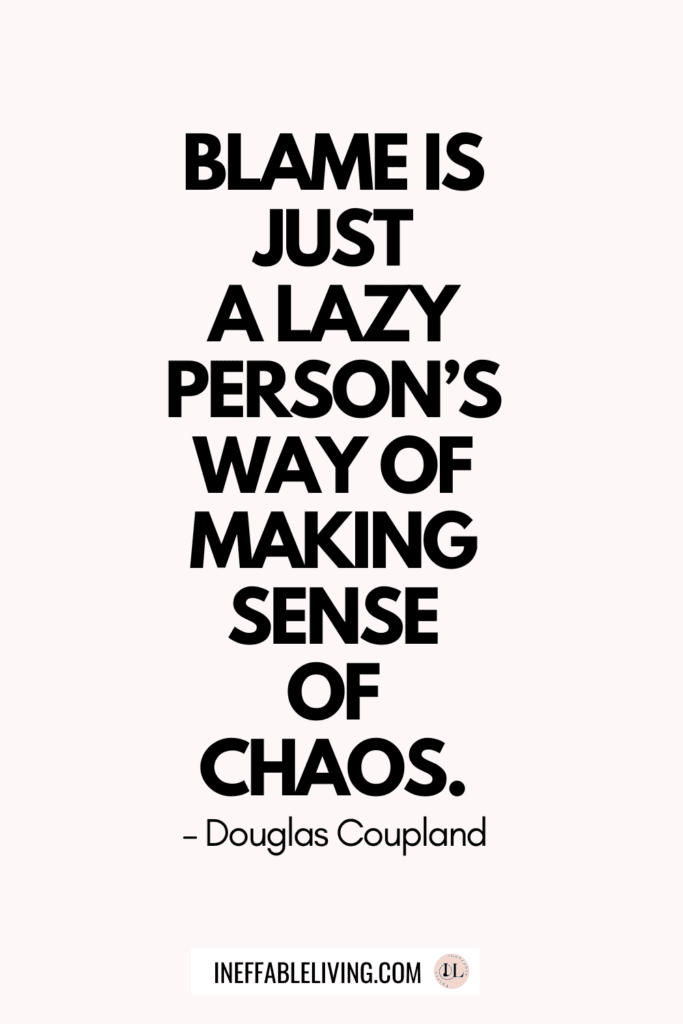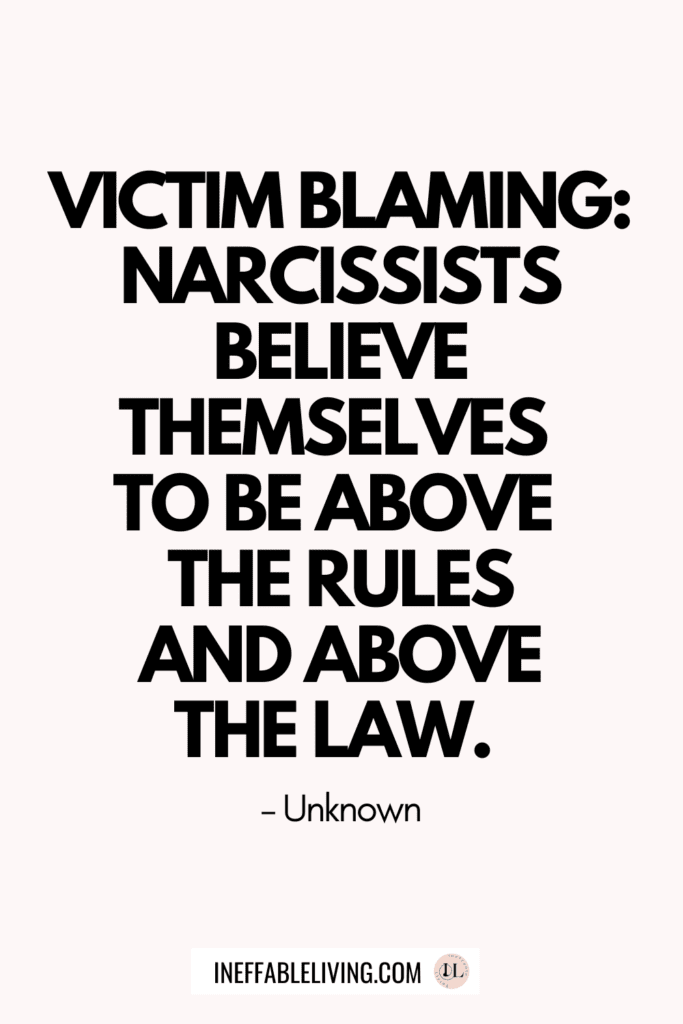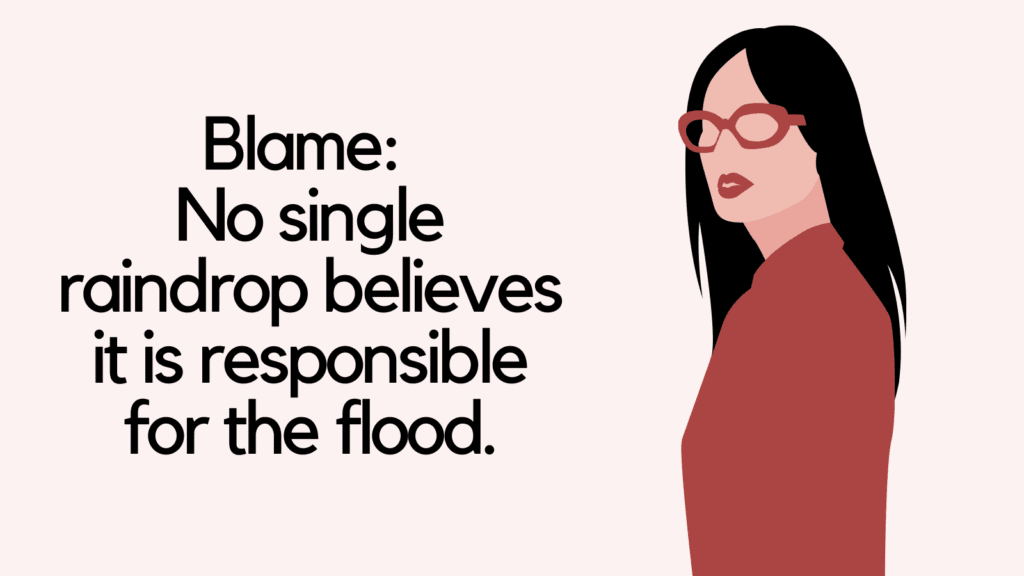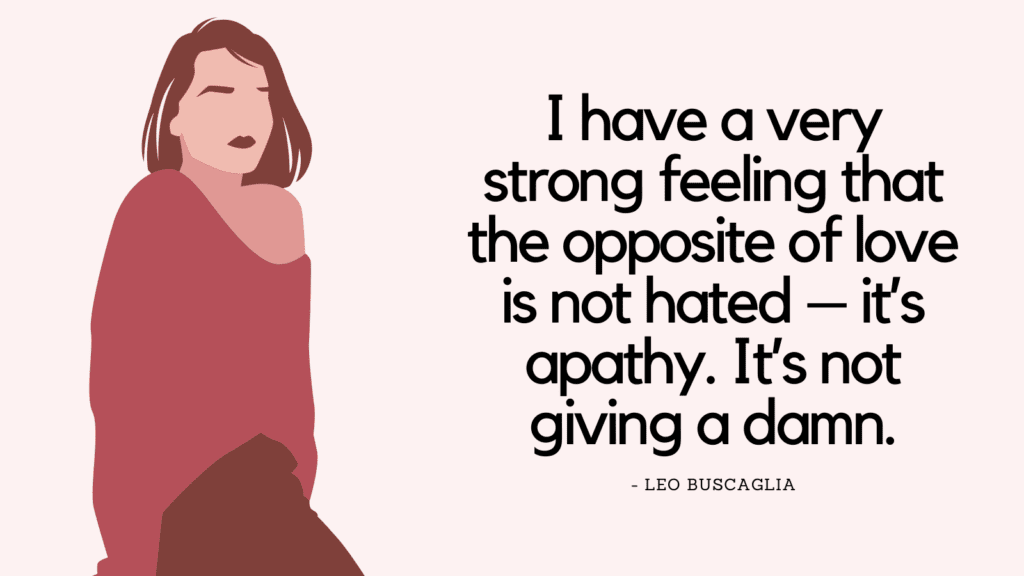This post contains some of the best blame game quotes.
Blame Game Quotes
1. “A narcissist will not, they just blame everything on everybody else, then move onto someone unaware of their manipulation.” – Unknown
2. “Blame-shifting is a natural human reaction. It happens on the smallest to the largest scale.” – H G Tudor
3. “Narcissist Abuse: Blame shifting: You ask the abuser to make more time for the relationship and they tell you that you are always too busy with your friends lately for them.” – Unknown
4. “Narcissists cannot ever admit to any wrongdoing. Why would they? In their eyes, they don’t ever do anything wrong. They think they don’t make mistakes. What they do is blame others. It’s called blame shifting.” – Unknown
5. “Victim Blaming: Narcissists believe themselves to be above the rules and above the law. When called out on their unethical, immoral or even criminal behavior, they react by discrediting the victim to others, portraying them as unbalanced, unstable or weak.” – Unknown
6. “A defense mechanism narcissists use that involves condemning others for their own emotions, traits, reactions, and behaviors. A narcissist projects without being provoked. Although the narcissist may project their positive attributes onto you (mirror image), most of the time they are scraping the mud off of themselves and smearing it onto you. Everything they say precisely describes them, but it mind screws you so bad it may leave you asking yourself the question, “Am I the narcissist?”” – Unknown
Related: How To Set Boundaries With Narcissistic Parents?

7. “The narcissist, successfully changes the topic and diverts your attention by pointing the finger at you, nd you suddenly find yourself on the defensive end of the conversation stick. The narcissist will raise questions about any and all of your real, or perceived faults, and pummel you. You, in turn, instinctively defend yourself, and the narcissist, just like magic, makes the original topic of their bad behavior disappear and escapes having to take any accountability for their actions. Then your blamed for creating problems and drams, in the relationship.” – Unknown
8. “Hypocrites get offended by the truth.” – Jess C. Scott
9. “When people are lame, they love to blame.” – Robert Kiyosaki
10. “Blame: No single raindrop believes it is responsible for the flood.” – Unknown
11. “Blame is just a lazy person’s way of making sense of chaos.” – Douglas Coupland
12. “The narcissist blames his her behavior on something that you are or aren’t doing.” – Melanie Tonia Evans
13. “Relationships fail because people take their own insecurities and try and twist them into their partner’s flaws.” – Unknown
14. “People who ruin their own lives have a strong tendency to blame other people when things go wrong.” – Daniel G. Amen
15. “Stay away from people who can’t take responsibility for their actions and who make you feel bad for being angry at them when they do you wrong.” – Unknown
16. “We live in a culture of blame. People will blame anyone or anything for their misery sooner than take the responsibility to own it and make it better.” – Henry Cloud
17. “Some people love being victims because they love being able to blame someone else. Accountability is too much for them. They don’t like being responsible for who they have become or where they are in life.” – Unknown
Related: How Narcissists Treat Their Exes (+FREE Worksheets PDF)
18. “People with “cluster B” type personality disorders (controlling, abusive, manipulative) don’t question themselves. They don’t consider the possibility of the problem being theirs. They always blame someone else.” – Unknown
19. “If you are looking to inspire people then blaming is the last thing you want to do. To inspire others, focus your attention on the solution not the blame. No good comes from blame, good comes from finding a way to correct the situation.” – Kate Summers
20. “People are always blaming their circumstances for what they are. I don’t believe in circumstances. The people who get on in this world are the people who get up and look for the circumstances they want, and if they can’t find them, make them.” – George Bernard Shaw

21. “Human nature was all about shifting blame… and responsibility. How else could you explain concentration camps and genocide and all the awful things people did to each other every day? They just carried on life and pretended like the evil didn’t exist, as long as it was happening out of their direct view.” – Rachel Caine
22. “Blame-shifting, framing, and false accusations are mainstay abuse tactics for sociopaths. If you are being subjected to any of these, it’s highly likely you’re dealing with a sociopath. That’s particularly the case when false accusations are being directed towards government authorities in order to get you in trouble with police, courts, CPS, or other agencies that often side with sociopaths.” – Unknown
Related: Top 25 Signs You’re Dating a Psychopath – and How to Heal From Psychopathic Abuse
23. “Toxic people blatantly deny their own manipulative behavior and ignore evidence when confronted with it. They become dismissive and critical if you attempt to disapprove their fabrications with facts. Instead of them actually addressing their inappropriate behavior, somehow it always becomes your fault for being “sensitive” and “crazy”. Toxic people condition you to believe that the problem isn’t the abuse itself, but instead your reactions to their abuse.” – Unknown
24. “Narcissists will purposely give us the silent treatment when we try talking to them about something. When we ask them why they aren’t responding, the Narcissists will simply state, “I’m not going to argue with you.” Say what? What just happened there! How did it go to being our fault? How did they spin that around? You see, that’s their way of deflecting any and all responsibility off of them and blame shifting us. They want us to think everything is our fault so we end up apologizing to them!” – Unknown
25. “Selective amnesia by harmful people is blame-shifting. According to FreeDictionary.com, “Blame-shifting is when someone shifts the blame from person to person.” The root of blame-shifting is when an abusive person fails to take responsibility for their cruelty.” ― Dana Arcuri

How to Deal With Blame Game?
Dealing with the blame game can be challenging, but it’s important to approach it with patience, empathy, and a focus on finding solutions. Here are some steps you can take:
1. Stay calm: When faced with blame, it’s essential to remain composed and avoid getting defensive. Take a deep breath and remind yourself to stay calm throughout the conversation.
2. Listen actively: Give the person blaming you an opportunity to express their concerns fully. Practice active listening by maintaining eye contact, nodding, and asking clarifying questions to ensure you understand their perspective accurately.
3. Avoid getting defensive: Instead of immediately reacting defensively, try to understand why the other person is blaming you. Take responsibility for your part if you have made a mistake, but don’t accept unwarranted blame. Communicate your position calmly and assertively.
4. Empathize: Show empathy towards the person blaming you. Acknowledge their feelings and validate their concerns. This can help defuse tension and create a more cooperative environment for finding a resolution.
5. Take ownership: If you have made a mistake or contributed to the situation, take ownership of your actions. Apologize genuinely and outline the steps you will take to rectify the issue or prevent it from happening again.
6. Focus on finding solutions: Shift the conversation from blame to problem-solving. Offer suggestions and collaborate with the other person to find practical solutions. Emphasize that finding a resolution is more important than assigning blame.
7. Communicate assertively: Clearly express your thoughts and feelings in a respectful and assertive manner. Use “I” statements to convey how the blame affects you and suggest alternatives for better communication and collaboration moving forward.
8. Seek mediation if necessary: If you’re unable to resolve the blame game on your own, consider involving a neutral third party such as a supervisor, mediator, or HR representative. They can help facilitate a constructive conversation and find a fair resolution.
Conclusion
Dealing with the blame game requires patience and a willingness to work towards finding common ground.
By focusing on understanding, empathy, and problem-solving, you can navigate these situations more effectively.



